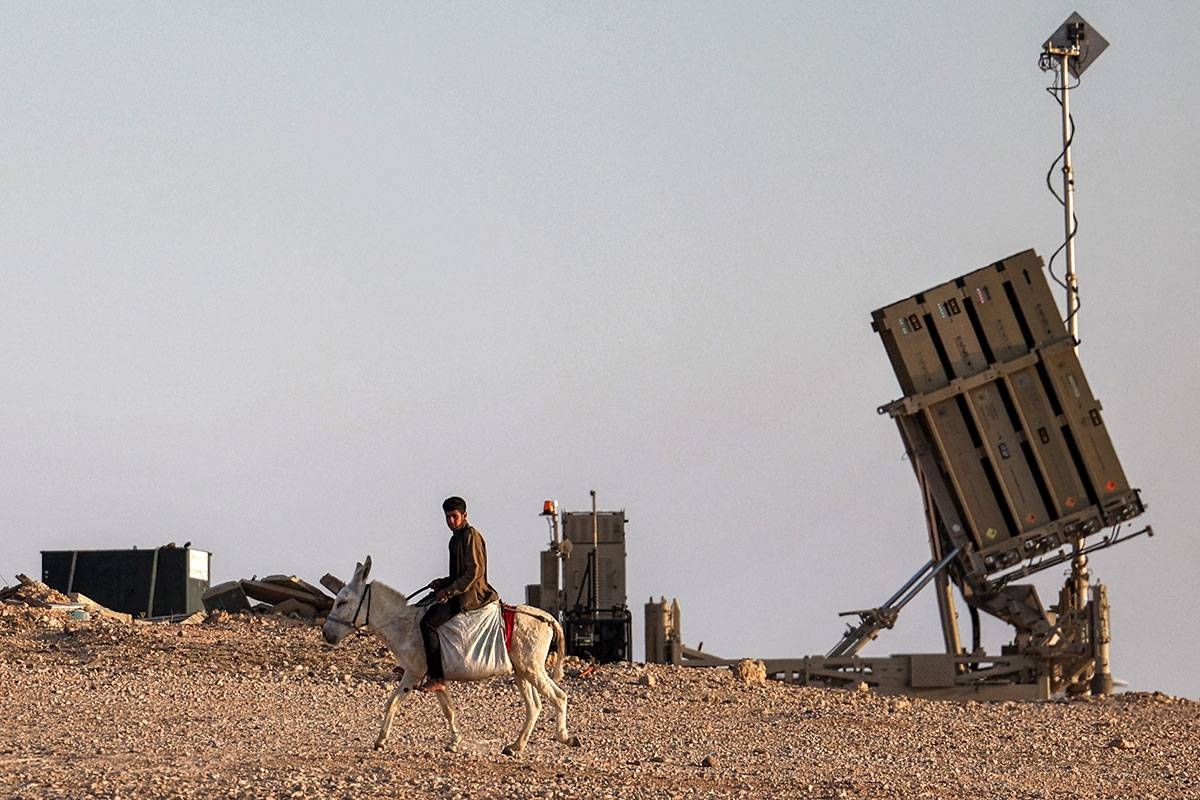JERUSALEM: World powers urged restraint on Sunday (Monday in Manila) for fear that Iran’s unprecedented missile and drone strikes on Israel could spark a wider war in the Middle East, as the United Nations heard a call for new sanctions against Tehran.
Iran launched the attack, its first ever to directly target Israeli territory, in retaliation for a deadly airstrike widely blamed on Israel that destroyed Tehran’s consular building in Syria’s capital early this month.
 A boy rides a donkey near one of the batteries of Israel’s Iron Dome missile defence system at a village not recognised by Israeli authorities in the southern Negev desert on April 14, 2024. AHMAD GHARABLI / AFP
A boy rides a donkey near one of the batteries of Israel’s Iron Dome missile defence system at a village not recognised by Israeli authorities in the southern Negev desert on April 14, 2024. AHMAD GHARABLI / AFP
The strikes raised Middle East tensions to a dangerous new level six months into a deadly conflict between Israel and the Palestinian militant group Hamas in Gaza, prompting international cries of alarm.
“Neither the region nor the world can afford more war,” UN Secretary-General Antonio Guterres told the body’s Security Council as it met to discuss Saturday’s Iranian attack.
“The Middle East is on the brink,” he warned. “The people of the region are confronting a real danger of a devastating full-scale conflict. Now is the time to defuse and de-escalate.”
Israel’s UN envoy, Gilad Erdan, urged the Council to “impose all possible sanctions on Iran before it’s too late” and “condemn Iran for their terror.”
G7 leaders earlier said they were ready to “take further measures” in response to “destabilizing initiatives.”
Iran’s UN envoy, Amir Saeid Iravani, retorted that the Islamic republic was exercising its “inherent right to self-defense” and “had no choice” but to act.
He insisted his country did “not seek escalation or war” but would respond to any “threat or aggression.”
Israel and its allies intercepted the vast majority of the more than 300 incoming projectiles, the Israeli army said, reporting 12 people injured and no deaths, but the attack sharply heightened fears of an Israeli counterstrike.
“Together, we thwarted Iran’s attack, Israeli military spokesman Rear Adm. Daniel Hagari said in a televised statement.
“This was the first time that such a coalition worked together against the threat of Iran and its proxies in the Middle East.”
G7 leaders condemned Iran’s attack and called for “restraint” on all sides, European Council President Charles Michel wrote on X after a video conference.
“We will continue all our efforts to work toward de-escalation. Ending the crisis in Gaza as soon as possible, notably through an immediate ceasefire, will make a difference.”
Israel’s top ally the United States also urged caution and calm.
“We don’t want to see this escalate,” White House National Security Council spokesman John Kirby told NBC. “We’re not looking for a wider war with Iran.”
US warns against retaliation
A senior US official said President Joe Biden had told Israeli Prime Minister Benjamin Netanyahu that Washington would not offer military support for any retaliation on Iran.
“We would not be a part of any response they do,” the official told reporters on a call, speaking on condition of anonymity. “We would not envision ourselves participating in such an act.”
Biden reaffirmed the United States’ “ironclad” support for Israel but also appeared to guide it away from a military response against the two countries’ common adversary, Iran.News outlet Axios reported that Biden had told Netanyahu he should “take the win” and that Washington would oppose an Israeli counterattack.
Iran’s mission to the United Nations also warned Washington to keep out of its conflict with Israel.
It added in a message on X that “the matter can be deemed concluded.”
Peaceful resolution
The Philippines on Monday called on Israel and Iran to settle their conflict peacefully to prevent their dispute from escalating further.
The Department of Foreign Affairs (DFA) on Monday urged “all parties to refrain from escalating the situation and to work toward a peaceful resolution of their conflict.”
“The Philippines has long advocated for all states to adhere to the principles of international law and to the peaceful settlement of disputes,” the DFA said in a statement.
The Philippines expressed its “serious concern over the increasing tension between Israel and Iran,” the DFA said.
There are more than 30,000 Filipinos in Israel and over 2,000 in Iran.
The Philippine Embassy in Tel Aviv on Sunday shared on its Facebook some videos released by Israeli authorities on how to stay safe during a “rocket alert” or attack.
“During a missile attack, we may be outdoors during the alert. In such a case, take cover in the closest structure,” the narrator said.
If there is no structure nearby, “lie down on the ground and cover your head using your hands. If there is a nearby mound or other natural cover, try to get behind them.”
When the missile impacts, the blast goes upwards. Someone sitting or standing may get hit by shrapnel. Someone lying down is protected even if the missile landed nearby.
“So, if you are outdoors and hear a siren, lie on your stomach, protect your head and wait 10 minutes,” the video stated.
“Upon hearing a siren, it is not enough to enter the protective space. It is extremely important to make sure all doors and windows are both closed and bolted,” it said.
The Philippine Embassy in Amman on Sunday advised Filipinos in Jordan “to remain vigilant, avoid unnecessary travels, and to continue monitoring the security situation through reputable source1s.”
*****
Credit belongs to : www.manilatimes.net
 Atin Ito First Filipino Community Newspaper in Ontario
Atin Ito First Filipino Community Newspaper in Ontario






